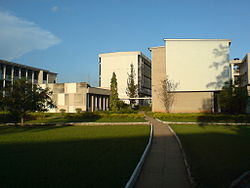 Arms of the Kwame Nkrumah University of Science and Technology | |
| Motto | Ashanti Twi: Nyansapɔ wɔsane no badwenma [1] |
|---|---|
Motto in English | The knot of wisdom is untied only by the wise [1] |
| Type | Public |
| Established | 1952; 73 years ago [2] |
| Chancellor | King Osei Tutu II [3] (Asantehene) |
| Vice-Chancellor | Prof Rita Akosua Dickson |
Administrative staff | 4,178 |
| Students | 85,000+ (2023) [4] |
| Undergraduates | - |
| Postgraduates | 2,306 |
| Location | , , 06°40′43″N01°34′16″W / 6.67861°N 1.57111°W |
| Campus | Suburban area |
| Colours | Lust, black, forest green and yellow |
| Affiliations | See below |
| Website | www.knust.edu.gh |
 | |
Kwame Nkrumah University of Science and Technology (KNUST) is a public university located in Kumasi, Ashanti region, Ghana. The university focuses on science and technology. [5] It is the second public university established in the country, as well as the largest university in the Ashanti Region of Ghana. [6]
Contents
- History
- Early history
- Campuses
- Kumasi Campus
- Obuasi Campus
- Organization and administration
- Principal officers
- Governing body
- Student participation in university administration
- Collegiate system
- Housing and accommodation
- Halls of residence
- Hostels
- International students
- Academics
- College of Agriculture and Natural Resources CANR
- College of Health Sciences
- College of Humanities and Social Sciences
- College of Art and Built Environment
- College of Engineering
- College of Science
- Institute of Distance Learning
- Library and digital resources
- Affiliated institutions
- Research centres
- Media
- Radio
- Television
- Awards and recognition
- Department of Food Science and Technology
- Notable people
- Notable alumni
- Notable academics
- References
- External links
KNUST has its roots in the plans of Agyeman Prempeh I, a ruler of the Ashanti Kingdom, to establish a university in Kumasi as part of his drive towards modernization of his Ashanti kingdom. [7] This plan never came to fruition due to the clash between British empire expansion and the desire of King Prempeh I to preserve his Ashanti kingdom's independence. [7] However, his younger brother and successor, King Asantehene Agyeman Prempeh II, upon ascending to the Golden Stool in the year 1935, continued with this vision. [7] Events in the Gold Coast in the 1940s played into his hands. First, there was the establishment of the University College of the Gold Coast. [8] Secondly, there were the 1948 Accra riots and the consequent Watson Commission report, which recommended that a university of sciences be established in Kumasi. [9] Thus, in 1949, the dream of the Prempehs became a reality when building started on what was to be called the Kumasi College of Technology. [10]
The Kumasi College of Technology offered admission to its first students to the engineering faculty in 1951 (however, those students started academic work in 1952), and an Act of Parliament gave the university its legal basis as the Kumasi College of Technology in 1952. [11] The nucleus of the college was formed from 200 teacher training students transferred from Achimota College in the Greater Accra Region. The college was affiliated to the University of London. In 1961, the college was granted full university status. [12]
The university covers a total land area of 2,512.96 acres (1,016.96 ha). [13] The main campus which is about seven square miles in area, is about eight miles (13 km) to the east of Kumasi, the Ashanti Regional capital. [14]








